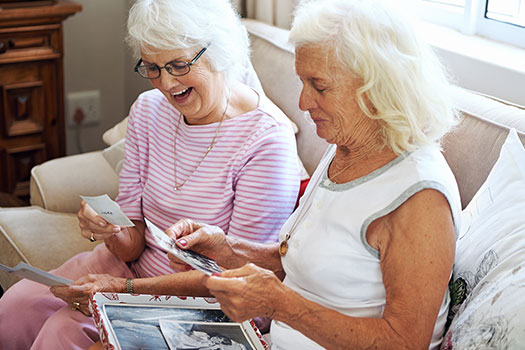Seniors with Alzheimer’s disease often crave familiarity. Your senior loved one may feel happy being surrounded by familiar people and items. Familiarity is one of the most important aspects of Alzheimer’s care. Here is a detailed look at familiarity and its significance.
Why Is Familiarity So Important to Seniors with Alzheimer’s?
Alzheimer’s disease affects areas of the brain that store memories and process information, which makes it difficult for seniors to remember new information. The disease can also make it challenging for the brain to figure out tasks and activities that require processing new information. However, the brain remembers old information and routines for a very long time, which means seniors with Alzheimer’s disease automatically follow the old routines they are used to.
Aging adults with Alzheimer’s disease can benefit from receiving professional Alzheimer’s care. Anchorage seniors need regular mental stimulation when managing memory-related conditions, and a reliable in-home caregiver who has extensive training in Alzheimer’s care can be a great asset.
What Does Familiarity Do for a Senior with Alzheimer’s?
Being in a familiar setting and following old routines can be extremely comforting, and it can help seniors with Alzheimer’s disease stay calm and relaxed. Some seniors are better able to concentrate on difficult tasks when they are in a familiar place that does not distract or scare them. Seniors with Alzheimer’s disease frequently experience emotional distress or behavioral issues in unfamiliar places.
How Can You Help Your Loved One Manage Unfamiliar Subjects?
Seniors with Alzheimer’s disease may encounter situations and people they do not recognize, which can provoke distress, anxiety, or even anger. If your loved one is in an unfamiliar environment, try to lower his or her anxiety by avoiding loud sounds, sudden movements, bright lights, and excessive conversation. Instead of forcing your loved one to confront and recognize unfamiliar situations, try to reassure and comfort him or her. If possible, distract your loved one with a familiar activity he or she likes, such as completing a puzzle.
Recovering from a stroke, managing the symptoms of Alzheimer’s, and a variety of other health-related situations can make it difficult for a senior to continue living at home without someone there to help. Anchorage, AK, live-in care professionals are trained to help seniors who need 24/7 assistance. With the help of a live-in caregiver, your elderly loved one can maintain a higher quality of life while aging in place.
How Can You Use Familiarity to Help with Caregiving?
Since familiarity is so important to seniors with Alzheimer’s disease, it can be a valuable caregiving method. If possible, stick to a regular schedule for daily grooming, food, medication, and toileting. Knowing what to expect constantly can give a senior with Alzheimer’s disease a sense of time and help him or her feel more relaxed and comfortable. If your loved one needs to move to a new location, try to decorate it with his or her old furniture and clothing to encourage a sense of familiarity. Keep in mind repeated behavior can transfer a memory into the long-term storage part of the brain, so you can gradually help your loved one become accustomed to new activities.
Alzheimer’s disease is a serious health issue that could impact your loved one’s memory and the ability to perform daily tasks independently. If your senior loved one has been diagnosed with a serious condition and needs help with tasks like meal prep, transportation, bathing, and grooming, reach out to Home Care Assistance, a home care Anchorage, AK, families can trust. We also offer comprehensive care for seniors with dementia, Alzheimer’s, and Parkinson’s. To learn about our premier in-home care plans, call us at (907) 770-0907 today.
